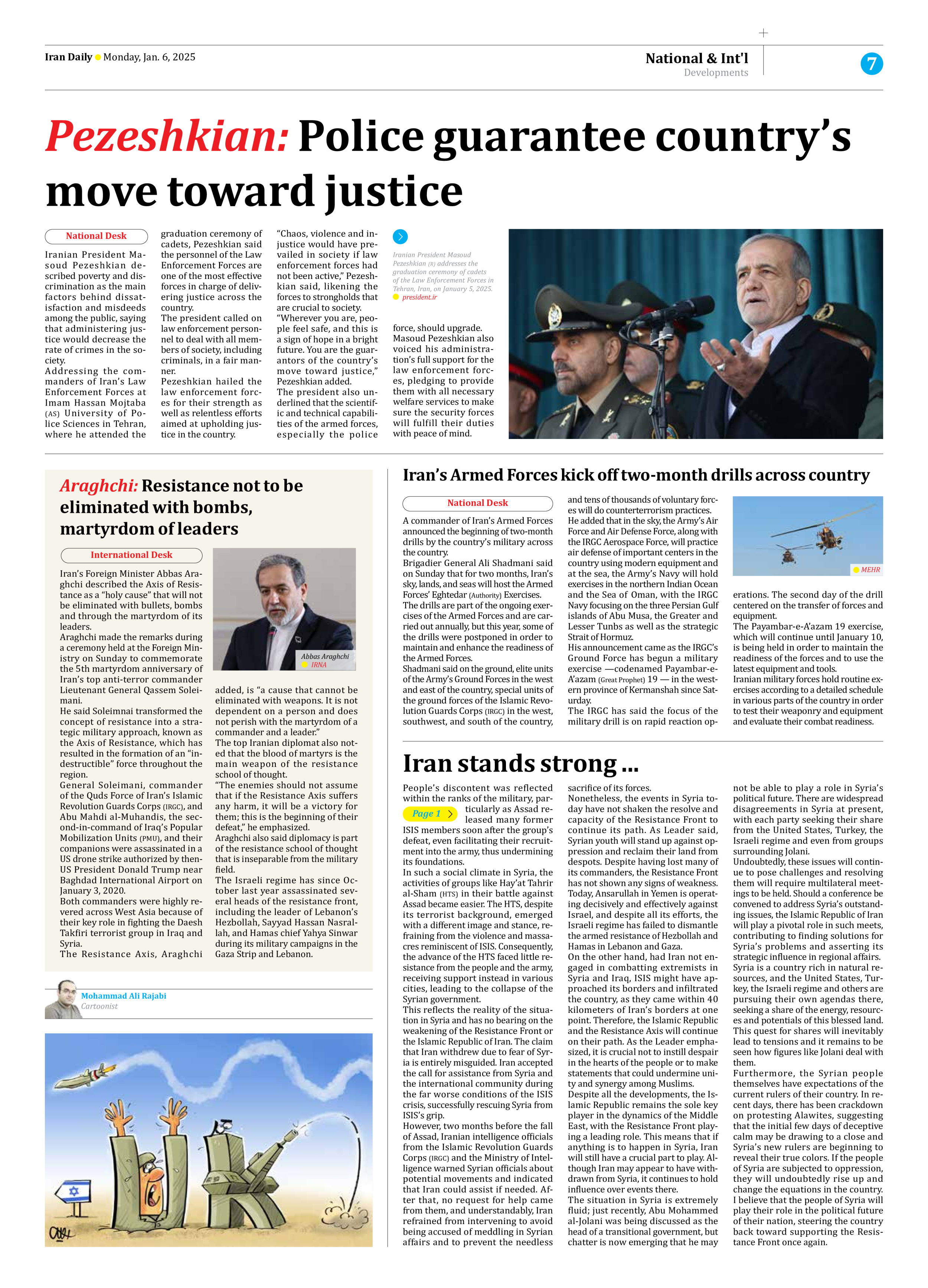
Iran stands strong ...
Page 1
People’s discontent was reflected within the ranks of the military, particularly as Assad released many former ISIS members soon after the group’s defeat, even facilitating their recruitment into the army, thus undermining its foundations.
In such a social climate in Syria, the activities of groups like Hay’at Tahrir al-Sham (HTS) in their battle against Assad became easier. The HTS, despite its terrorist background, emerged with a different image and stance, refraining from the violence and massacres reminiscent of ISIS. Consequently, the advance of the HTS faced little resistance from the people and the army, receiving support instead in various cities, leading to the collapse of the Syrian government.
This reflects the reality of the situation in Syria and has no bearing on the weakening of the Resistance Front or the Islamic Republic of Iran. The claim that Iran withdrew due to fear of Syria is entirely misguided. Iran accepted the call for assistance from Syria and the international community during the far worse conditions of the ISIS crisis, successfully rescuing Syria from ISIS’s grip.
However, two months before the fall of Assad, Iranian intelligence officials from the Islamic Revolution Guards Corps (IRGC) and the Ministry of Intelligence warned Syrian officials about potential movements and indicated that Iran could assist if needed. After that, no request for help came from them, and understandably, Iran refrained from intervening to avoid being accused of meddling in Syrian affairs and to prevent the needless sacrifice of its forces.
Nonetheless, the events in Syria today have not shaken the resolve and capacity of the Resistance Front to continue its path. As Leader said, Syrian youth will stand up against oppression and reclaim their land from despots. Despite having lost many of its commanders, the Resistance Front has not shown any signs of weakness. Today, Ansarullah in Yemen is operating decisively and effectively against Israel, and despite all its efforts, the Israeli regime has failed to dismantle the armed resistance of Hezbollah and Hamas in Lebanon and Gaza.
On the other hand, had Iran not engaged in combatting extremists in Syria and Iraq, ISIS might have approached its borders and infiltrated the country, as they came within 40 kilometers of Iran’s borders at one point. Therefore, the Islamic Republic and the Resistance Axis will continue on their path. As the Leader emphasized, it is crucial not to instill despair in the hearts of the people or to make statements that could undermine unity and synergy among Muslims.
Despite all the developments, the Islamic Republic remains the sole key player in the dynamics of the Middle East, with the Resistance Front playing a leading role. This means that if anything is to happen in Syria, Iran will still have a crucial part to play. Although Iran may appear to have withdrawn from Syria, it continues to hold influence over events there.
The situation in Syria is extremely fluid; just recently, Abu Mohammed al-Jolani was being discussed as the head of a transitional government, but chatter is now emerging that he may not be able to play a role in Syria’s political future. There are widespread disagreements in Syria at present, with each party seeking their share from the United States, Turkey, the Israeli regime and even from groups surrounding Jolani.
Undoubtedly, these issues will continue to pose challenges and resolving them will require multilateral meetings to be held. Should a conference be convened to address Syria’s outstanding issues, the Islamic Republic of Iran will play a pivotal role in such meets, contributing to finding solutions for Syria’s problems and asserting its strategic influence in regional affairs.
Syria is a country rich in natural resources, and the United States, Turkey, the Israeli regime and others are pursuing their own agendas there, seeking a share of the energy, resources and potentials of this blessed land. This quest for shares will inevitably lead to tensions and it remains to be seen how figures like Jolani deal with them.
Furthermore, the Syrian people themselves have expectations of the current rulers of their country. In recent days, there has been crackdown on protesting Alawites, suggesting that the initial few days of deceptive calm may be drawing to a close and Syria’s new rulers are beginning to reveal their true colors. If the people of Syria are subjected to oppression, they will undoubtedly rise up and change the equations in the country. I believe that the people of Syria will play their role in the political future of their nation, steering the country back toward supporting the Resistance Front once again.







